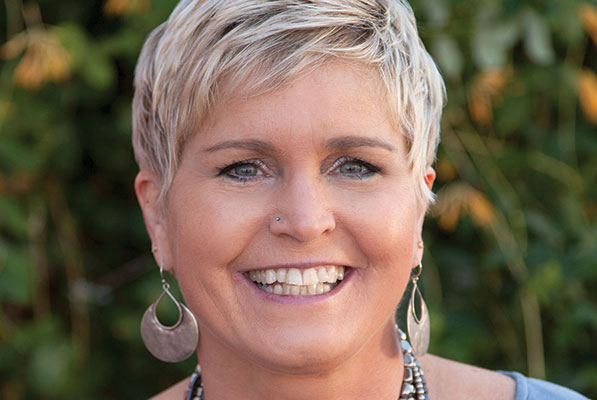Finding My Cancer Lifeline
by Roberta Aberle
Cancer has always been a constant in my family. Even from an early age, I’ve always known I was at risk. Several uncles and aunts, as well as three of my grandparents, lost their lives to cancer. When a few cousins were diagnosed, my fears increased. I began doing everything I could to mitigate my risks – eating the right foods, exercising regularly, avoiding toxins, and just taking care of myself.
But then the big one hit. At age 47, my older sister was diagnosed with stage III ovarian cancer. Grieving so many losses in our extended family had been hard enough, but this time, it hit me in the gut. Not only was I grappling with watching someone close to me fight cancer, but my own internal risk gauge switched into high gear.
Building a Community
From the very beginning, I realized my family was playing the “telephone game” far too often. My sister would call my mom or me with a health update, then we’d call other relatives and friends, and they’d pass the information along. But by the time the last person in line got the update, facts would get polluted and often totally distorted.
Recognizing that accurate communication was crucial, I began writing down my sister’s health updates, trying my best to translate the complicated medical language while also accurately conveying the intricate details. At first, I emailed people. Then, when my sister entered hospice, I began posting updates to her Facebook profile. Still, I often found myself frustrated by the limitations, especially by how to share news and updates with all the people who needed to be informed.
Nonetheless, posting these updates helped keep us sane. We were no longer overwhelmed by the overload of calls and messages. When my sister passed and I began posting about her memorial service, the site took on a life of its own. More people than ever added comments. It made me wish I’d been able to reach all these people who could have encouraged my sister while she was still alive.
But I also held a deep conviction that by keeping my fight with cancer private, I was shutting the door on the very people who would help me conquer it.
I still visit her site seven years later. Of course, it isn’t the only way I remember her, but I still find comfort in re-reading entries. Sometimes, I post a new update just about missing her.
Not long after my sister passed, a colleague who was fighting stage IV colon cancer invited me to join an online support site through MyLifeLine.org. It was her way of keeping family and friends updated throughout her cancer journey. Little did I know at the time that I was about to embark on a similar journey.
Finding Support
Within 10 days, when my worst fears happened and I had to grapple with my own cancer diagnosis, I knew it was essential for me to create my own MyLifeLine site. I had a mix of emotions and concerns about maintaining privacy. I worried about losing my job like my sister had. But I also held a deep conviction that by keeping my fight with cancer private, I was shutting the door on the very people who would help me conquer it.
The benefits of a strong support structure for people with cancer are both proven and measurable. But I have my own anecdotal evidence to add. When I have a bad day, an encouraging comment on the MyLifeline site can motivate me.
I would like to say I’m cancer-free or in remission, but I’m not. I’m in a holding pattern. A shift in my health insurance coverage means I am now unable to afford a treatment I need. The financial strain that accompanies a cancer diagnosis can never be underestimated. Nevertheless, I’m trying to go back to work. Fatigue is still a problem, but otherwise I feel nearly normal.
Though I still struggle sometimes, MyLifeLine has become a true lifeline for me. Without being able to share my health updates and my raw emotions, without the encouragement and support of others, and without my skilled oncologist and nurses, I’d be in a much different place than I am right now. I strive to be an exception to the statistics. Until then, I continue to press forward.
Roberta Aberle is a primary peritoneal carcinoma survivor living in Denver, CO. You can follow her cancer journey at MyLifeLine.org/RobertaAberle.
MyLifeLine.org is a nonprofit organization that encourages cancer survivors and caregivers to build an online support community of family and friends through free personalized websites. Learn more at MyLifeLine.org.
This article was published in Coping® with Cancer magazine, January/February 2017.


